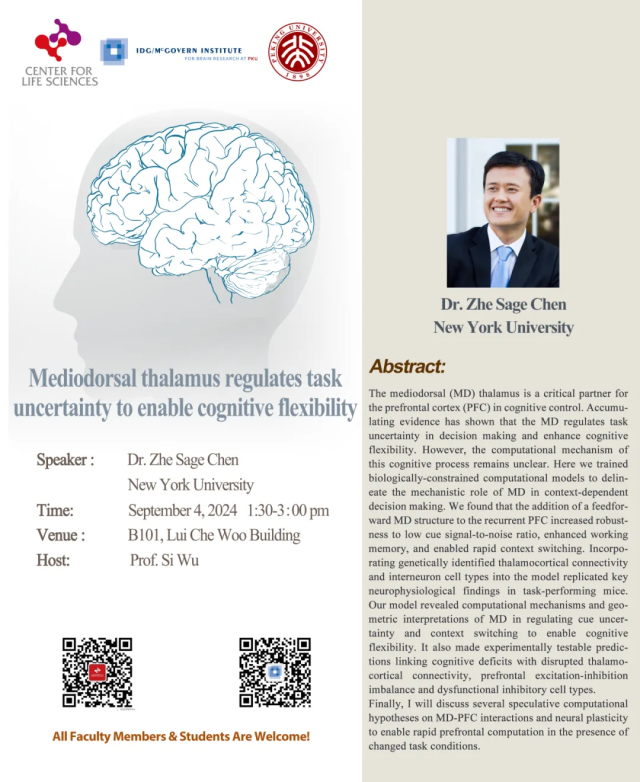Title: Mediodorsal thalamus regulates taskuncertainty to enable cognitive flexibility
Speaker:Dr. Zhe Sage Chen,New York University
Time:1:30–3:00 pm, September 4, 2024
Venue: B101, Lui Che Woo Building
Host: Prof. Si Wu
Abstract
The mediodorsal (MD) thalamus is a critical partner for the prefrontal cortex (PFC) in cognitive control. Accumulating evidence has shown that the MD regulates task uncertainty in decision making and enhance cognitive flexibility. However, the computational mechanism of this cognitive process remains unclear. Here we trained biologically-constrained computational models to delineate the mechanistic role of MD in context-dependent decision making. We found that the addition of a feedforward MD structure to the recurrent PFC increased robustness to low cue signal-to-noise ratio, enhanced working memory, and enabled rapid context switching. Incorporating genetically identified thalamocortical connectivity and interneuron cell types into the model replicated key neurophysiological findings in task-performing mice. Our model revealed computational mechanisms and geometric interpretations of MD in regulating cue uncertainty and context switching to enable cognitive flexibility. It also made experimentally testable predictions linking cognitive deficits with disrupted thalamocortical connectivity, prefrontal excitation-inhibition imbalance and dysfunctional inhibitory cell types.
Finally, I will discuss several speculative computational hypotheses on MD-PFC interactions and neural plasticity to enable rapid prefrontal computation in the presence of changed task conditions.
Short Bio
Dr. Zhe Sage Chen is a principal investigator at New York University School of Medicine (NYUSOM), where he directs the Computational Neuroscience, Neuroengineering and Neuropsychiatry (CN3) Laboratory. He is the co-director of Computational Psychiatry Program at the NYU Department of Psychiatry. He is also a faculty member of the Training Program of Computational Neuroscience at NYU and an affiliated faculty member of the Neuroscience Institute at NYUSOM, and associated faculty in the Department of Biomedical Engineering at the NYU Tandon School of Engineering.
He is a computational neuroscientist and an electrical engineer. His work has focused on using statistical/biophysical modeling, computational statistics, and machine learning methods to help understand representations of neuroscience data, to decipher important neural circuit mechanisms of targeted brain circuits, such as the hippocampus, prefrontal cortex, and motor cortex of rodents and non-human primates. In collaboration with experimental neuroscientists, his team has developed real-time brain-machine interfaces to conduct closed-loop neuroscience experiments, such as detecting acute pain signals for acute pain signals for pain neuromodulation, and decoding animal’s trajectory paths during off-line memory reactivation. Finally, He has been gradually building his research portfolio along the direction of computational psychiatry and translational neuroscience, aiming to bridge the gap between animal and human research.
